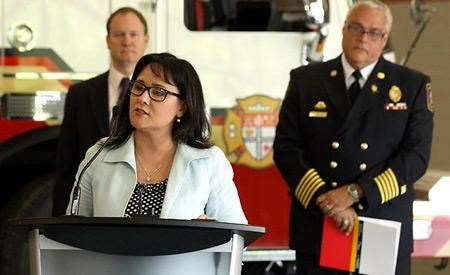Two City of Powell River elected officials are ready to jump on new rules for medical marijuana that they say may produce own-source revenue.
Mayor Dave Formosa and Councillor Debbie Dee talked about the opportunity during the June 20 committee-of-the-whole meeting.
The federal government has finalized new regulations for medical marijuana, which will create conditions for a new, commercial industry that is responsible for its production and distribution. Patients will be allowed to buy prescribed amounts only from licensed producers approved by Health Canada. The government will no longer produce or distribute medical marijuana and users will no longer be allowed to grow the plant at home.
Formosa, who added the topic to the agenda, said he has been approached by people interested in setting up large, commercial operations in the city. One proponent was exploring an 80,000-square-foot facility that would employ 15 to 20 people on one shift. “The requests are going to start coming for zoning requirements for new business ventures,” he said. “Own-source revenue opportunities may be there for us. It’s coming fast.”
The new rules offer an “incredible opportunity for the city to consider being the licence holder,” said Dee.
The land the city owns as part of PRSC Limited Partnership could be used both for a medical marijuana operation as well as for growing hemp, Dee added.
“There has been a lot of interest in our community as of late, people who are setting up and getting ready for this commercial enterprise,” she said. “They’re looking for land and we have land.”
Dee added that she thought there should be a staff report prepared to explore whether the city could be the licence holder and lease to the producers.
Councillor Chris McNaughton agreed there should be a staff report. “There isn’t a business in the community that’s already doing this, so we’re not impacting business negatively,” he said. “This may be one of those unique opportunities where the city does, as Councillor Dee suggested, hold the licence and is involved in a more direct way than just taxation. It could create a new revenue stream.”
Formosa explained that he wasn’t saying that the city would be the licence holder. “But it may want to consider a partnership in a licence, because you need expertise in this area,” he said. “I agree with Councillor Dee that this is a huge opportunity.”
Formosa made the motion directing staff to prepare a report with recommendations about “the general idea of supporting medicinal marijuana/hemp growing and research in the City of Powell River.” Dee seconded the motion and it passed unanimously.
Mac Fraser, chief administrative officer, said he thought the motion was appropriate, because before proceeding, council would want to deal with the socio/political issues of growing marijuana in the city’s jurisdiction. From his limited research and his experiences in other communities, Fraser added, “the system they’re going to is a whole lot better. Council will have to approve, either indirectly by zoning or by building permit, the actual facilities that grow.”
With the current program, growers don’t need to apply to local governments for either rezoning or building permits. “It’s really, really problematic,” Fraser said.
Since its introduction in 2001, Health Canada’s Marijuana Medical Access Program has grown from under 500 authorized persons to over 30,000 today, according to a statement from Health Canada. “This rapid increase has had unintended consequences for public health, safety and security as a result of allowing individuals to produce marijuana in their homes,” the agency stated. “Under the new regulations, production will no longer take place in homes and municipal zoning laws will need to be respected, which will further enhance public safety.”
The government also stated that the regulations will streamline the process for applicants and health care practitioners. Under the new regime, individuals will not be required to provide personal medical information to Health Canada. Health care practitioners will be able to sign a medical document enabling patients to purchase the appropriate amount related to their conditions directly from a licensed producer approved by Health Canada.



